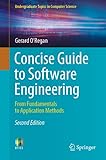Concise Guide to Software Engineering [electronic resource] : From Fundamentals to Application Methods /
Material type: TextSeries: Undergraduate Topics in Computer SciencePublisher: Cham : Springer International Publishing : Imprint: Springer, 2022Edition: 2nd ed. 2022Description: XXVII, 444 p. 126 illus., 104 illus. in color. online resourceContent type:
TextSeries: Undergraduate Topics in Computer SciencePublisher: Cham : Springer International Publishing : Imprint: Springer, 2022Edition: 2nd ed. 2022Description: XXVII, 444 p. 126 illus., 104 illus. in color. online resourceContent type: - text
- computer
- online resource
- 9783031078163
- 005.1 23
- QA76.758
1. Fundamentals of Software Engineering -- 2. Ethics and Professional Responsibility -- 3. Ethical Software Engineering -- 4. Software Project Management -- 5. Requirements Engineering -- 6. Software Design and Development -- 7. Software Inspections -- 8. Software Testing -- 9. Data Science and Privacy -- 10. Software Metrics and Problem Solving -- 11. Supplier Selection and Management -- 12. Configuration Management -- 13. Software Quality Assurance -- 14. Agile Methodology -- 15. Software Reliability and Dependability -- 16. Formal Methods -- 17. Z Specification Language.
This long-awaiting new edition of an essential textbook concisely introduces the fundamental principles of software engineering, also offering practical guidance on how to apply the theory in a real-world, industrial environment. The wide-ranging coverage encompasses all areas of software design, management, and quality. Topics and features: Presents a broad overview of software engineering, including software lifecycles and phases in software development, and project management for software engineering Includes key learning topics, summaries, and review questions in each chapter, together with a useful glossary Discusses professional responsibilities of software engineers Discusses ethical and privacy challenges in software engineering, software design and development, and project management and outsourcing Explains formal methods, a set of mathematical techniques to specify and derive a program from its specification Describes innovations in the field of software as distributed systems, service-oriented architecture, software as a service, cloud computing, and embedded systems Investigates legal aspects of software engineering including patent and copyright law, as well as legal aspects of outsourcing Examines the field of cybersecurity and cybercrime This practical and easy-to-follow textbook/reference is ideal for computer science students seeking to learn how to build high-quality and reliable software on time and on budget. The text also serves as a self-study primer for software engineers, quality professionals, and software managers. Dr. Gerard O’Regan is an Assistant Professor in Mathematics at the University of Central Asia in Kyrgyzstan. He is the author of several books in the Mathematics and Computing fields, including A Brief History of Computing, with Springer.


There are no comments on this title.